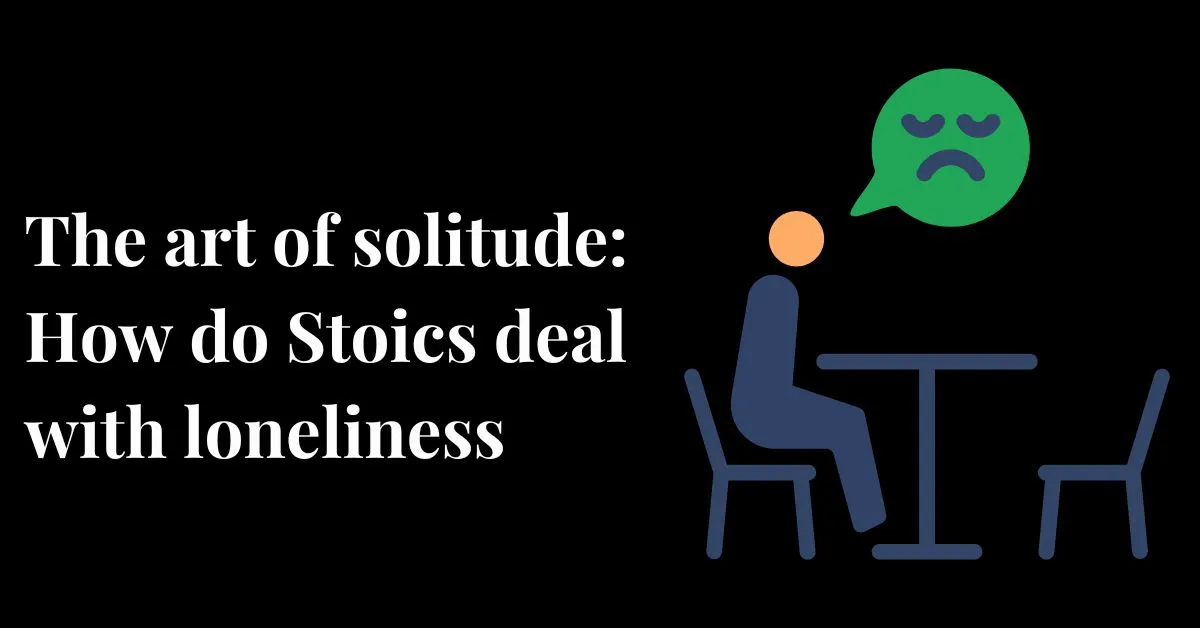Loneliness is a feeling that strikes deep into the heart of one’s being, leaving an emptiness that seems impossible to fill. It’s a haunting and complex emotion that grips you tightly, making you feel completely isolated from the world.
While loneliness can devastating consequences on our lives, it is important to recognize that it can also have positive aspects. Understanding its nature and underlying causes is a major step towards developing effective strategies to address it.
In this blog post, we will explore how Stoics deal with loneliness, including developing inner strength, cultivating resilience, and building self-sufficiency. By adopting these principles, we can learn to manage our emotions and develop the resilience to find beauty in solitude.
Table of Contents
What is loneliness?
Being lonely can be all-consuming, overwhelming us with a sense of emptiness and despair that feels like it will never go away. But understanding loneliness means recognizing that it’s a normal part of the human experience – something that everyone will go through at some point in their lives.
However, it’s important to understand that there are healthy and unhealthy forms of loneliness. Healthy loneliness is a natural response to certain situations, such as a temporary separation from loved ones or a desire for solitude. It can be a time for reflection and self-discovery, allowing us to grow and become stronger in the face of adversity.
On the other hand, unhealthy loneliness is a persistent feeling of isolation and disconnection from others that can lead to serious mental and physical health problems. It can leave us feeling trapped in a cycle of negative thoughts and behaviors, making it even harder to break free and reach out to others.
While being lonely can have negative effects on our lives, it’s important to recognize that it can also have positive effects. It can motivate us to seek out new connections and experiences, pushing us out of our comfort zones and into new and exciting opportunities.
Ultimately, understanding loneliness means recognizing that it’s a complex and nuanced emotion that can have a significant impact on our lives. It’s up to us to distinguish between healthy and unhealthy forms of loneliness, and to seek out the support and connection we need to overcome feelings of isolation and despair.
Stoic Approach to Dealing with Loneliness
Developing inner strength
Developing inner strength is about learning to stand strong in the face of life’s challenges, even when we feel like we’re falling apart. It’s about finding the courage to face our fears head-on, and the resilience to keep going when things get tough. For me, Stoicism has been an invaluable tool in developing this resilience, particularly when it comes to dealing with loneliness.
Accepting the reality of our situation can be incredibly difficult, especially when it involves facing feelings of isolation and disconnection from others. But by acknowledging that loneliness is a normal part of the human experience, we can begin to shift our perspective and find the strength to face our emotions head-on. Instead of feeling ashamed or embarrassed by our loneliness, we can learn to embrace it as a natural part of the human experience.
Focusing on what is within our control can be empowering, helping us to reclaim agency and control over our lives. Rather than feeling helpless in the face of our loneliness, we can take proactive steps to address its root causes. We can reach out to friends and family for support, engage in activities that bring us joy, and work to cultivate meaningful connections with others.
Cultivating resilience
The journey of resilience is a deeply personal one, marked by both triumphs and setbacks. As someone who has struggled with loneliness, I’ve found that Stoicism offers valuable insights into how to cultivate the inner strength and resilience needed to overcome life’s challenges.
Practicing mindfulness has been a key part of my journey towards greater resilience. By learning to be present in the moment and fully engage with my thoughts and emotions, I’ve been able to gain a greater sense of self-awareness and cultivate a more grounded perspective on my experiences. Instead of feeling overwhelmed by my loneliness, I’ve learned to observe my emotions with curiosity and compassion.
Developing a positive mindset has also been essential to my journey towards resilience. By focusing on the good in my life and reframing my thoughts in a more positive light, I’ve been able to shift my perspective and cultivate a more optimistic outlook on life. Rather than feeling weighed down by my loneliness, I’ve learned to appreciate the meaningful connections I do have and look for ways to cultivate more.
Conclusion
How do Stoics deal with loneliness? Loneliness is a complex emotion that can have both positive and negative effects on our lives. By understanding the nature of loneliness and identifying the underlying causes, we can develop effective strategies to address it. The Stoic approach to dealing with loneliness emphasizes developing inner strength, cultivating resilience, and building self-sufficiency. By accepting the reality of our situation, focusing on what is within our control, and using adversity as an opportunity for growth, we can learn to manage our emotions and overcome loneliness. By practicing these principles, we can develop the inner strength and resilience needed to lead fulfilling lives, even in the face of loneliness.
For more resources on beating loneliness, check out the following links:
https://www.bhf.org.uk/informationsupport/heart-matters-magazine/wellbeing/dealing-with-loneliness
https://www.nuffieldhealth.com/article/10-ways-to-take-action-against-loneliness
